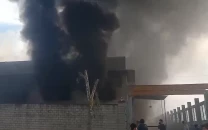Most Pakistanis clueless about Arab-style revolution
Confusion, lack of organisation bars youth from crossing threshold.

At a focus group discussion organised jointly by the Pakistan Institute of Peace Studies (PIPS) and Khudi Pakistan, most of the youth appeared clueless about what was required to trigger a “revolution” in the country.
While some demonstrated considerable understanding of Arab Spring, most took it as a mere symbol of revolt against the “corrupt rulers, dictators and hegemony”, without understanding its dynamics.
“I was so inspired by the Arab Spring... I wanted something like that to happen in Pakistan but I know it won’t because we are different from the Arab countries,” said an International Relations student from Quaid-i-Azam University.
“The Arab Spring originated from within the community and it would be unfair to attribute it to some foreign interference. Pakistan, however, should only deduce one lesson from it — that dictatorship does not work,” said one of his colleagues at the discussion.
Other students merely expressed their frustration while asking question ranging from asking what factors were stopping Pakistani youth from a revolution to what were the successes and failures of the Arab Spring.
“We have had similar rampant corruption and oppressive regimes in our country. Why don’t the people stand up against it? I believe that someday, people will do it,” said a student from Iqra University.
In reply to the feedback and questions, Professor Khadim Hussain gave some clarity to the youth. Hussain said no movement can cater only to a particular interest group or be completely homogenous.
“For any revolutionary movement to succeed in this country, it needs to give equal share to every interest group involved,” said Hussain. The paradox in this country has been that people who are in politics actually work against the political process, said Professor Hussain.
He was supported by Ahsan Kamal, a lecturer from National Institute of Pakistan Studies (NIPS), who said the youth in Pakistan lacked organisational support to mobilise a popular movement. “This is the reason such movements are always hijacked by the people who were trained in mobilisation,” said Kamal adding the hijackers were either political elements or religious parties.
Other speakers highlighted certain obvious differences between Middle Eastern countries and the state of democracy in Pakistan, certain that no Arab Spring would hit Pakistan in the foreseeable future.
Published in The Express Tribune, June 9th, 2012.


















COMMENTS
Comments are moderated and generally will be posted if they are on-topic and not abusive.
For more information, please see our Comments FAQ